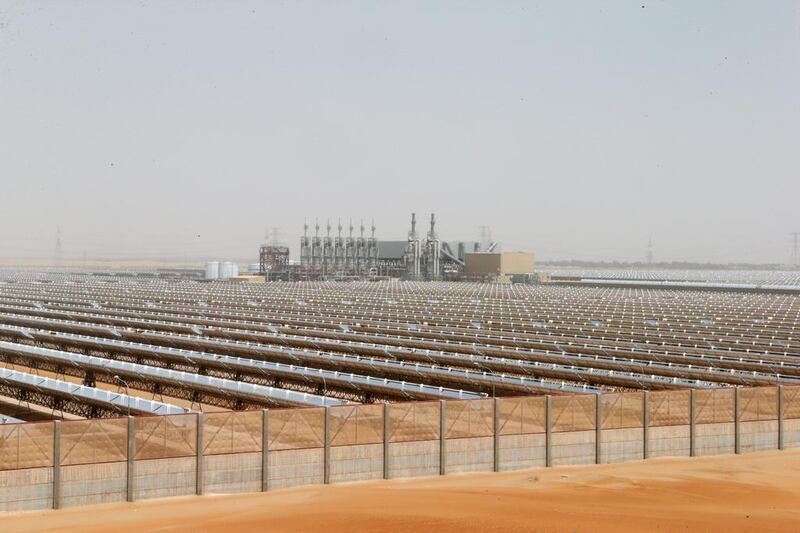The Middle East and North Africa region's growing commitment to develop renewable sources of energy has lifted sentiment on the outlook for economic development, according to a study commissioned by The National.
More projects, mainly in solar, have come online in the region as the cost for equipment continue to fall. In addition, governments are setting new targets for the proportion of electricity to come from renewable and clean sources, freeing up gas and crude feedstock to be used elsewhere.
Borderless Access polled more than 500 high-level executives from the UAE and Saudi Arabia with more than 90 per cent of respondents agreeing that the significant additional capacity of solar and wind energy sources will be of benefit to regional economies.
“Meeting power generation targets through renewable energy in the region is poised to grow,” said Dushyant Gupta, Borderless Access’s senior vice president. “With enormous resources for both solar and wind energy available in the region, this focus on non-conventional route is primed to become more prominent.”
The Middle East Solar Industry Association (Mesia) says that the Middle East North Africa region had nearly 700 megawatts of solar energy in operation by the end of 2015, according to a report released this month. Last year, about 200MW were added and another 200MW will be online by April. “We see a pipeline of more than 5,700MW of upcoming projects throughout the Mena region,” said Wim Alen, Mesia’s secretary general.
About 56 per cent of respondents in the UAE agree that more renewables will increase the pace of economic development, while 38 per cent strongly agree. The UAE is one of the main movers and shakers in the region with its world record-breaking prices for electricity generated by solar in Dubai for two years in a row.
The upcoming announcement from Abu Dhabi on its 350MW Sweihan tender may not only be another low price, but the project is also said to have been expanded to more than 1,000MW.
Saudi Arabia was even more bullish than its UAE peers, with 56 per cent strongly agreeing that renewables will have an impact.
Saudi Arabia’s energy ministry has announced the creation of the Renewable Energy Project Development Office (Repdo) to help implement the 9,500MW clean energy target in just six years. The country issued a request for qualification on February 20, closing in July, for 700MW of solar and wind projects, the first round of which will be awarded in September.
There are other measures happening in the UAE this year including the expected launch of the US$27 billion Green Fund. Dubai is also aiming to install solar panels on every rooftop in the emirate by 2030 and Abu Dhabi is currently seeking consultations for solar rooftop regulations.
In 2015, Acwa Power of Saudi, with partner TSK of Spain, achieved a then all-time-low of 5.84 US cents per kilowatt hour for the 200MW second phase of Dubai’s Mohammed bin Rashid Al Maktoum solar park. Last year, Masdar won the 800MW third phase at 2.99 cents per kWh.
lgraves@thenational.ae
Follow The National's Business section on Twitter





